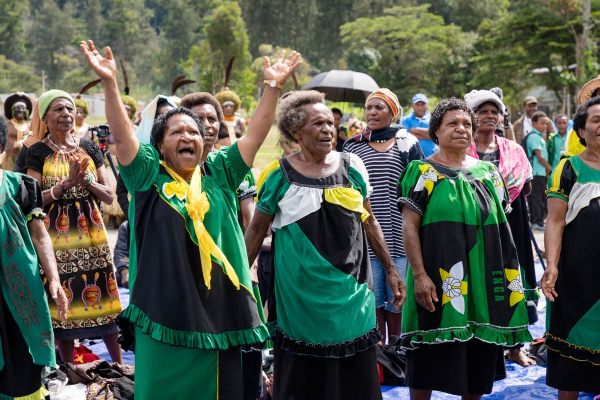Found Family: Four Stories of Unexpected Connection

I’m not actually related to at least half the people I consider family.
In the overseas missions community where I grew up, the kids referred to the adults as “Mr.” or “Miss” only at school; everywhere else we used the more familiar titles of “uncle” and “aunt.”
Our lives were so intertwined that we knew each other much more deeply than people typically do even in most small towns. We were in each other’s homes and at each other’s tables constantly, sharing holidays, birthdays, lazy afternoons and spontaneous game nights. It wasn’t always pretty, but we knew we belonged to each other.
Just as the Bible provides guidance and comfort, having Scripture in your own language can deeply impact your sense of belonging and connection within a community.
During our own time serving in Bible translation overseas a few years ago, my husband, our girls and I also found friends who became more like family.
Not only did we grow close to the people who shared our daily rhythms, but we also recognized those relationships as God’s sweet provision for us in a situation that could have been extremely lonely.
4 Biblical Examples of Found Families
From the Garden of Eden on, God has created people to live together as families, providing care, support and connection for one another. Often family units are bound together by genetics or legal documents but some of the most beautiful relationships in the Bible are ones where God drew unlikely people together in unexpected ways.
Here are four stories of “found families” in Scripture.
1. Two Grieving Women From Opposing Cultures (Ruth 1, 4)
You might know this story already: Naomi, her husband Elimelech and their two sons left their home in Bethlehem to escape a famine. They moved to the neighboring country of Moab, whose idolatrous culture deeply offended faithful Jews.
The family set down roots, Elimelech died and was buried there, and the boys grew up to marry Moabite women before they died too. That left Naomi alone with her daughters-in-law, Ruth and Orpah,
When Naomi decided to return to Bethlehem, Ruth wasn’t obligated to go with her; in fact Naomi released her daughters-in-law from any familial responsibility and tried to send them back to their parents’ homes where they would have the opportunity to remarry.
Orpah left, but Ruth refused, saying: “Don’t ask me to leave you and turn back. Wherever you go, I will go; wherever you live, I will live. Your people will be my people, and your God will be my God” (Ruth 1:16b, NLT).
Ruth knew that going with Naomi would likely mean a life of poverty and hardship. And, as a woman from Moab, she might be rejected by the Jewish community. But she went anyway.
These two women from different backgrounds could’ve easily parted ways, but they became inseparably connected as they scratched out a living and made a new home together. And when Ruth eventually married Boaz, Elimelech’s relative, they provided for Naomi’s needs, even allowing her to raise their first son as her own.
Bible translation makes this possible, fostering unity and transformation. Ruth, known for her sacrificial devotion, exemplifies this unity through her commitment to Naomi.
2. A Scrappy Shepherd and a Prince (1 Samuel 18-20, 2 Samuel 9)
When Jonathan, the oldest son of King Saul, first met David the connection between them was immediate. The friendship between the wiry young shepherd and the prince grew as David became part of Saul’s court.
The two forged a bond that was akin to family: “And Jonathan made a solemn pact with David, because he loved him as he loved himself. Jonathan sealed the pact by taking off his robe and giving it to David, together with his tunic, sword, bow, and belt” (1 Samuel 18:3-4, NLT).
In handing over to David symbols of his royalty and military power, Jonathan was likely making a statement of loyalty to his own father’s rival. Saul, enraged over David’s popularity with the people, grew determined to kill David but Jonathan repeatedly intervened, eventually warning David to flee for his life.
Before David disappeared, Jonathan had one final request: “And may you treat me with the faithful love of the LORD as long as I live. But if I die, treat my family with this faithful love, even when the LORD destroys all your enemies from the face of the earth” (1 Samuel 20:14-15, NLT).
Time didn’t dull David’s commitment to the friend who’d become like a brother. Years after Jonathan died and David took the throne, David found his old friend’s only remaining son, Mephibosheth.
Instead of killing the last of Saul’s family — a potential threat to his own rule — David kept the vow he’d made.“‘Don’t be afraid!’ David said. ‘I intend to show kindness to you because of my promise to your father, Jonathan. I will give you all the property that once belonged to your grandfather Saul, and you will eat here with me at the king’s table!’” (2 Samuel 9:7, NLT).
3. A Fisherman and the Messiah’s Mother (Mark 3, Mark 10, Luke 9, John 19)
Jesus gathered with disciples most respectable teachers would have overlooked. John, a rough-edged fisherman, was no exception.
He and his brother James — who were nicknamed “Sons of Thunder” by Jesus — brashly asked for places of honor in God’s coming kingdom and impulsively suggested that Jesus should call fire down on a village that wouldn’t listen to them.
However, Jesus saw beyond John’s coarse exterior and the two grew close over the years they traveled together. Scripture implies that Joseph had died by the time Jesus began his public ministry, leaving Jesus to care for Mary in his place. Jesus’ death would’ve meant the end of his role as his mother’s protector and provider.
Instead of turning Mary over to the care of his younger brothers — which would’ve been appropriate and expected — Jesus chose his beloved friend John to care for his mother.
“Standing near the cross were Jesus’ mother, and his mother’s sister, Mary (the wife of Clopas), and Mary Magdalene. When Jesus saw his mother standing there beside the disciple he loved, he said to her, ‘Dear woman, here is your son.’ And he said to this disciple, ‘Here is your mother.’ And from then on this disciple took her into his home” (John 19:25-27, NLT).
While Scripture doesn’t directly tell us the reasons Jesus bypassed his brothers and placed his mother in John’s care, it’s clear that Jesus trusted John and gave him an ongoing place in his earthly family.
4. The First-Century Church (Acts 2)
One of the most memorable scenes in the Bible is the coming of the Holy Spirit at Pentecost. His sudden arrival, complete with the sound of a rushing wind filling the house and miraculous flames settling on each believer, enabled Jesus’ followers to speak other languages and empowered Peter to preach with such authority that 3,000 people joined their group that day.
The Spirit’s presence also prompted the fledgling church to make a radical change to their way of life: “And all the believers met together in one place and shared everything they had. They sold their property and possessions and shared the money with those in need. They worshiped together at the Temple each day, met in homes for the Lord’s Supper, and shared their meals with great joy and generosity — all the while praising God and enjoying the goodwill of all the people. And each day the Lord added to their fellowship those who were being saved” (Acts 2:44-47, NLT).
The early church’s commitment to community and sharing resources was rooted in their understanding of Scripture and the teachings of Jesus. Bible translation ensures that people today can continue to build these same communities, grounded in the truth of God’s Word.
Embracing Our Spiritual Family Today
Today the church may not sell everything they have and physically live together, but the call to be a family remains. Like God has drawn unlikely people together in the past, he continues to give us each other, reminding us of Jesus’ prayer for us:
And Jesus' desire for his people to love each other isn't limited by location or culture; our spiritual family includes the communities still waiting for Scripture in a language and format they clearly understand.
The stories of found families in the Bible show how powerful connections can be when people share a common bond in Christ. Similarly, when people today encounter Jesus through Scripture in a language that touches their hearts, lives often change in amazing ways.
Just like Ruth and Naomi, David and Jonathan and the early church experienced deep unity and support rooted in God, we too can experience this when we engage with God’s Word in a language that we understand.
You can play a part in God’s global work through Bible translation and bring the life-changing message of Scripture to people in their own languages, empowering them to build strong spiritual families and communities.
Whether through praying, giving financially or getting involved in translation efforts, your contribution can make a meaningful impact. Together we can ensure that everyone has the opportunity to encounter God through His Word, fostering unity and transformation across diverse cultures and communities.
We don’t need to be related to each other to be brothers and sisters in Christ and love each other well. The same Spirit that was in the early church is alive in us. We belong to each other, united by the transformative power of God’s Word. Join us in advancing Bible translation and witness the incredible ways God can work through His people when His Word is accessible to all.
Sign Up for Weekly “God Sightings” Text Messages
Each week, you can receive an update on what God is doing around the world — directly to your phone! Stay informed, inspired and encouraged by the latest news, and join us in praying for God’s name to be made known among the nations through the work of Bible translation.
Text SIGHTINGS to 407-358-0916 to get started.







